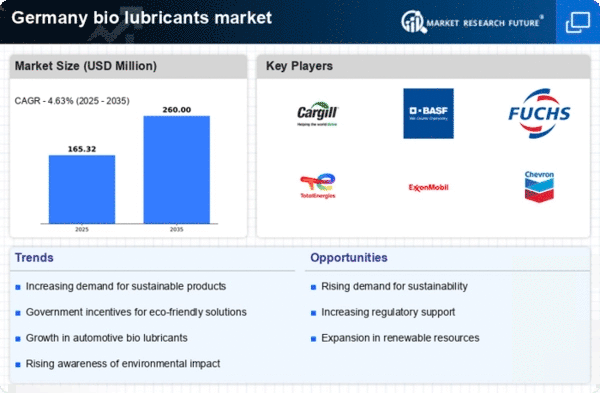Top Industry Leaders in the Germany Bio-lubricants Market

The German bio-lubricants market is expected to witness a steady growth, with a projected CAGR of 6% by 2032. This growth is driven by increasing environmental awareness, stringent regulations on emissions, and rising demand for sustainable products. However, the market faces challenges such as higher initial costs compared to mineral oils and limited availability of high-performance bio-lubricants.
Key Players and Strategies:
-
Global giants: Major players like ExxonMobil, Shell, and BP are entering the market through acquisitions and partnerships. They leverage their brand recognition and distribution networks to gain market share. For example, Shell acquired Naturelub, a bio-lubricant producer, in 2021. -
Specialty players: Fuchs Petrolub, Klüber Lubrication, and OMV are focusing on developing high-performance bio-lubricants for specific applications like wind turbines and agricultural machinery. They invest heavily in R&D to differentiate themselves. -
Regional players: Companies like Biesterfeld Spezialchemie and GreenChem specialize in offering customized bio-lubricant solutions to cater to niche segments. They emphasize close customer relationships and technical expertise.
Factors Influencing Market Share:
-
Product portfolio: Offering a diverse range of bio-lubricants for various applications can attract a wider customer base. -
Pricing strategy: Balancing sustainability with competitive pricing is crucial, especially considering the initial cost premium of bio-lubricants. -
Brand recognition: Established brands have an advantage in terms of customer trust and market access. -
Distribution network: A robust distribution network ensures efficient product delivery and market reach. -
Technical expertise: Providing technical support and guidance strengthens customer relationships and loyalty. -
Sustainability initiatives: Demonstrating a strong commitment to sustainability through certifications and eco-friendly practices attracts environmentally conscious customers.
Key Companies in the Bio-lubricants Market include
-
ExxonMobil (U.S.)
- Royal Dutch Shell (Netherland)
- Total S.A. (France)
- Cargill (US)
- P. (U.K.)
- FUCHS Group (Germany)
- Pangolin (Switzerland)
Recent News
August 2023:
- Evonik Industries acquires BL Chem, expanding its bio-lubricant portfolio in Europe.
- Fuchs Petrolub launches a new range of bio-based industrial gear oils with improved performance.
September 2023:
- The German government announces plans to invest €1 billion in research and development of sustainable lubricants, including bio-lubricants.
- BASF and Shell collaborate to develop bio-lubricants for the chemical industry.
October 2023:
- Klüber Lubrication unveils a new bio-based grease for food processing applications.
- The European Union tightens regulations on the use of mineral oils in sensitive environments, boosting demand for bio-lubricants.










